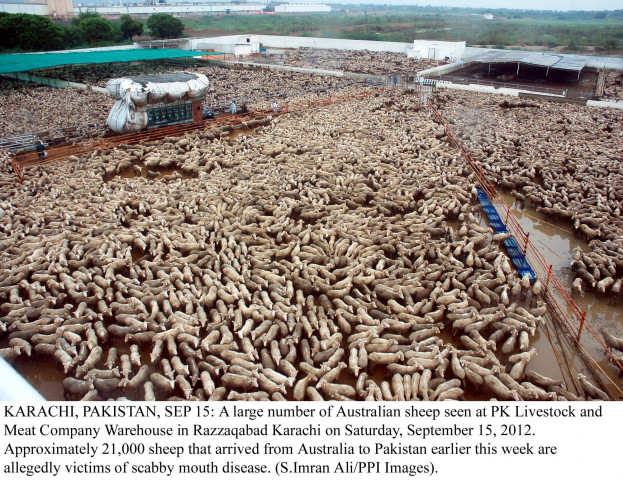SHC stays culling of Australian sheep, orders fresh lab tests
Committee to submit report within one week.

SHC stays culling of Australian sheep, orders fresh lab tests
A division bench, headed by Justice Maqbool Baqir, also directed the committee to submit its report within one week.
The order came after a petition had been filed by Tariq Mehmood Butt, who had approached SHC to seek a restraining order against culling of the 21,000 animals by the Karachi Municipal Administration.
Butt claimed he was sole importer of livestock and exporter of meat, and has established modern slaughter houses in the country. He submitted that he had imported the 21,000 sheep from Australia and sold the animals in Muscat, Oman and Qatar.
The importer stated that when the animals were off-loaded at Karachi Port, government authorities without permission collected samples of sheep to get them tested for scabby mouth disease.
The petitioner contended that the most modern testing facility in the country, the Islamabad-based Research and Safety Laboratory has already declared all the sheep as clean of any disease. But, he claimed, Sindh government authorities obtained samples without permission and got them tested at Elisa laboratory located in Tando Jam, which allegedly found them infected.
Butt contended on the basis of tests arranged by the government, Karachi administration had started culling the healthy animals, causing him huge losses. More than 1500 sheep have been culled and dumped at the same farm, where other animals are kept.
Petitioner claimed that healthy animals being culled may lead to ban on exports of meat from Pakistan, and may also harm bilateral ties with Australia. He prayed the court to restrain authorities from culling the healthy animals and order fresh tests at modern laboratory.
Opposing his plea, Secretary Livestock Nazir Kalhoro stated the animals were suffering from different diseases. He expressed the fear that the infection may spread in the country if the ailing animals were not culled and disposed off.
SHC division bench though constituted a committee headed by Secretary Livestock department to get fresh samples of the animals and get them tested at Islamabad-based Research and Safety Laboratory.
It also directed the committee to obtain the samples in presence of two Australian veterinary doctors and a welfare officer, who had arrived in Pakistan along with the sheep.
Issuing notice to provincial and federal government authorities, the bench restrained them from taking any coercive action against the petitioner till next date of hearing.
____________________________________________
[poll id="883"]



















COMMENTS
Comments are moderated and generally will be posted if they are on-topic and not abusive.
For more information, please see our Comments FAQ